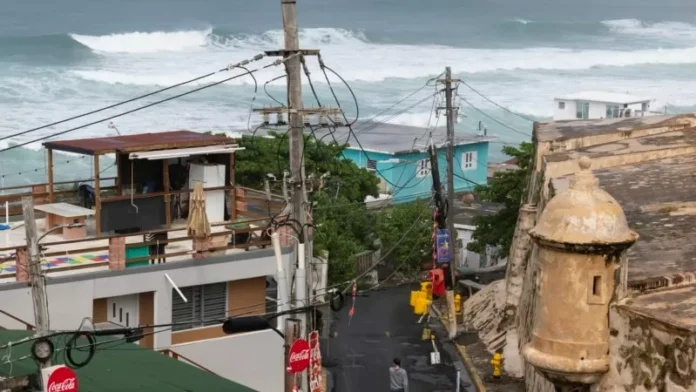SAN JUAN, Puerto Rico – The political landscape in Puerto Rico is undergoing a major shift as a new generation of leaders rises up to challenge the two parties that have long dominated the island’s politics. Frustrated with the rampant corruption, chronic power outages, and mismanagement of public funds, the people of Puerto Rico are demanding change and a brighter future for their beloved island.
In a historic turn of events, a third-party candidate is now leading in the polls for the upcoming governor’s race on Tuesday. Juan Dalmau, representing the Puerto Rico Independence Party and the Citizen Victory Movement, has gained significant momentum and is now a serious contender for the top spot. This marks a significant shift in Puerto Rican politics and has the potential to bring about a new era for the island.
Political analyst and university professor Jorge Schmidt Nieto describes this election as a “before and after” moment for Puerto Rico. The rise of a third-party candidate signals a growing dissatisfaction with the traditional parties and a desire for real change.
The current governor’s race is a tight race between Dalmau and Jenniffer González, a member of the New Progressive Party and Puerto Rico’s representative in Congress. A recent Gaither international poll shows Dalmau closing in on González, with 29% of support compared to her 31%. This is a significant improvement for Dalmau, who was trailing behind González in a previous poll in July.
The traditional parties, the New Progressive Party and the Popular Democratic Party, have long dominated Puerto Rican politics, with each party receiving at least 90% of the votes in general elections. However, the past few years have seen a shift in the political landscape, with the creation of a federal control board to oversee Puerto Rico’s finances and the island’s filing for bankruptcy in 2017. These events have exposed the deep-rooted corruption, mismanagement, and excessive borrowing that have plagued Puerto Rico for decades.
The island’s power outages, which have persisted since the devastating Hurricane Maria in 2017, have only added to the frustration and anger of the people. The slow pace of hurricane reconstruction and the government’s failure to address the crumbling electrical grid have further fueled the desire for change among voters.
Under the current governor, Pedro Pierluisi, the government signed contracts with two companies, Luma Energy and Genera PR, to oversee the generation, transmission, and distribution of power. However, the outages have continued, with the companies blaming the already crumbling grid and a lack of maintenance and investment. This has only added to the people’s frustration and has become a major issue in the upcoming election.
Political analyst Schmidt notes that voters are viewing this election as a “moment of revenge” and are looking for a candidate who can bring about real change and address the issues that have plagued the island for so long.
Juan Dalmau has promised to oust both companies within six months if he becomes governor. His opponent, Jesús Manuel Ortiz, has vowed to cancel Luma’s contract, while González has called for the creation of an “energy czar” to review potential contractual breaches. However, any contract cancellation would require approval from the federal control board and Puerto Rico’s Energy Bureau.
The candidates are also under pressure to address other pressing issues, such as creating affordable housing, reducing power bills and the cost of living, lowering crime rates, boosting the economy, and improving the crumbling healthcare system. These issues have been exacerbated by the exodus of thousands of doctors to the U.S. mainland.
Dalmau has also promised to eliminate tax breaks for wealthy U.S. citizens from the mainland, a move that has gained him support among the people. However, despite their promises to bring about change, the candidates are facing persistent voter apathy. In the 2020 election, only 1.3 million out of 2.3 million registered voters participated, a significant decrease from the 1.9 million who voted in 2008.
The upcoming election also has a new element in the form of popular reggaetón artist Bad Bunny. The singer has been vocal about his criticism of the island’s two main parties and has paid for dozens of billboard ads calling for change. His influence has been felt, with the governor’s New Progressive Party responding with a controversial billboard ad. Bad Bunny has not endorsed any specific candidate or party, but his recent decision to follow Juan Dalmau on Instagram has

